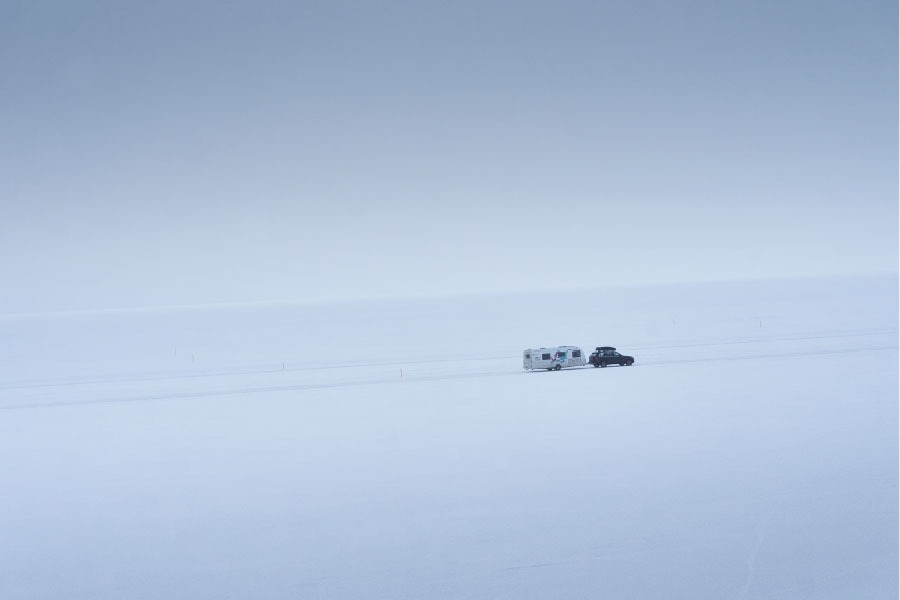Testing Times: How the new Unicorn 5 Surpassed the Grade 3 Heating & Insulation Test

Tests can range from practical to scientific with Alu-Tech leisure vehicles taking part in several real-world adventures aimed at testing both motorhomes and caravans in harsh environments. Bailey adventures include crossing Australia from west to east, negotiating ice roads to reach Finland’s Arctic Circle, and passing through twenty-one countries in as many days. However, this time, we’ll be looking at the scientific methods used to examine the all-new Unicorn Series 5’s heating and insulation.

What’s Grade 3?
Have you spotted a ‘Grade 3 Insulation’ sticker stuck to the side of a caravan or motorhome? Perhaps you’ve seen it in a sales brochure or handbook and wondered whether this heating and insulation combo can keep you nice and warm whatever the weather?
In a nutshell, the Grade 3 classification means your caravan or motorhome can heat itself from a ‘bracing’ -15°C to a cosy +20°C and have a fully functioning water system within a four-hour time limit. This may sound a trifle keen if your touring calendar begins at Easter and ends in September, but apart from making your heating more efficient and therefore cheaper during the warmer months, it opens up a raft of opportunities when the mercury drops.

Inside ALDE
The cold chamber is large enough to house a JCB digger, in fact, JCB regularly uses the chamber to test machinery resilience as they export to countries where temperatures regularly drop to oil-freezing levels. Police sniffer dogs have also patrolled within these walls, detecting frozen packages as part of a training programme, but the biggest test to date, however, was when it became the venue for a children’s Disney-themed ‘Frozen’ party during a Camping & Caravanning Club’s NCCW event…
For Grade 3 testing, the team turn the dial to -15°C, and to make sure it’s -15 in every corner of the caravan, all of the doors, windows and lockers are opened. Five probes monitor the centre and each corner before the caravan is then ‘soaked’ overnight at -15°C to make sure each and every part has dropped to the hyperthermia-inducing temperature. With the team dressed in arctic clothing, doors and windows are closed and the heating turned on. For maximum efficiency, the heating is run on a mixture of gas and electricity and the stopwatch is started. As Bailey work closely with ALDE (the company responsible for the Unicorn 5’s heating system) during the design stages, confidence was high, but no one thought the mercury would reach +20°C with over an hour to spare. The onboard water systems are then tested and if the taps and shower are functioning correctly, a Grade 3 classification is awarded.
However, even though the new Unicorn 5 achieved Grade 3 classification with ease, the story doesn’t end there. Speaking to the ALDE technicians during the test, they wondered if the new Unicorn could cope with a much harsher test. With a new cold chamber date booked, the overnight soak was conducted at -24°C and, unbelievably, the Series 5 Unicorn still reached the magic +20°C figure within the allotted four hours!
Do things always go to plan?
The aim of testing a new product is to highlight any potential issues and because of this, teams from ALDE and Bailey were monitoring progress throughout. Arriving after the overnight soak at -15°C, I was surprised to see the cold chamber doors open and the test halted. The monitoring kit had detected an issue that had been caused by part of the furniture impeding heater pipe progress. A remedy was discussed between ALDE and Bailey representatives before being passed to Bailey’s Product Development team in Bristol. Because of this test and the subsequent work from all involved, this restructured furniture section now features in the CAD drawings and newly manufactured parts, ensuring Unicorn owners – who are a hardy bunch – can enjoy their caravan whenever and wherever they like.

Latest news & events
See all news & eventsWinchester Caravans & Motorhomes Attending The Sothern Motorhome & Campervan Show
Newbury Showground, Chieveley, Berkshire




